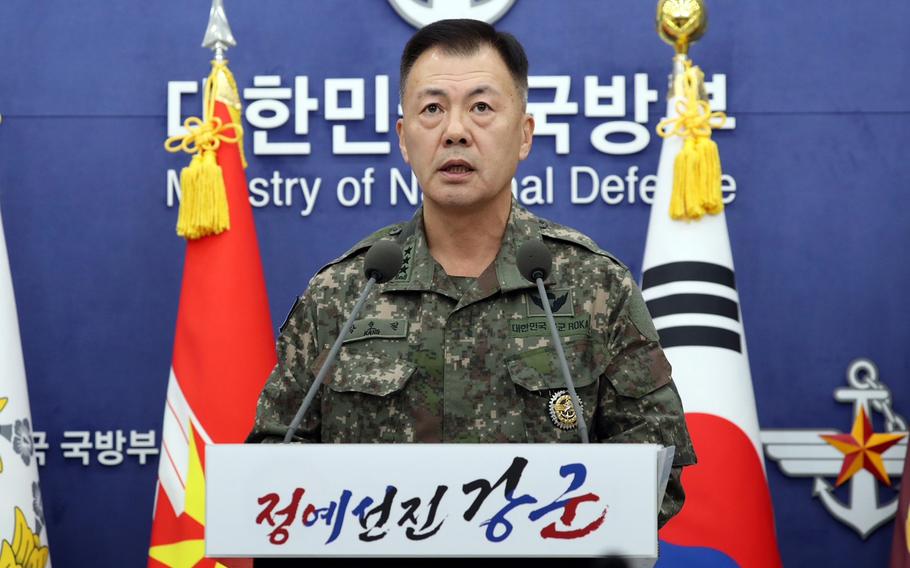
South Korean army Lt. Gen. Kang Hopil speaks to reporters at the Ministry of National Defense headquarters in Seoul, South Korea, Monday, Nov. 20, 2023. (South Korea’s Ministry of National Defense)
SEOUL, South Korea — A senior South Korean military official has warned the North to “immediately stop” preparations for a satellite launch, saying Monday that a test would prompt “necessary measures” to defend the country.
Pyongyang is pressing ahead with plans to put a military reconnaissance satellite into orbit, South Korean army Lt. Gen. Kang Hopil told reporters at the Ministry of National Defense headquarters in Seoul.
Kang, the chief director of operations for the country’s Joint Chiefs of Staff, said such a launch would be a “provocative act that undermines our national security.”
“If North Korea pushes ahead with the launch of a military reconnaissance satellite despite our warnings, our military will take necessary measures to ensure the lives and safety of its people,” he said.
Kang’s remarks come a day after Defense Minister Shin Won-sik told the Korean Broadcasting System that intelligence suggests the North is preparing to launch a satellite before the end of this month.
Neither Shin nor Kang elaborated on what concrete actions Seoul would take in the wake of a launch, though Shin said during the KBS interview that the Ministry of National Defense had recently explored the possibility of partially suspending an inter-Korean accord.
The Comprehensive Military Agreement, signed in 2018 by North Korean leader Kim Jong Un and then-South Korean President Moon Jae-in, was designed to lower tensions on the Korean Peninsula by prohibiting armed troops at the border and establishing no-fly zones.
Shin argued that North Korea has a history of violating accords and that the 2018 agreement unfairly “tied the hands and feet” of Seoul’s advanced forces.
“North Korea provokes whenever it needs to, whenever they think they have a chance of winning,” he said. “It’s not any document or verbal commitment … that can stop the provocation, but our strong power.”
North Korea has launched two satellites so far this year, both ending in failure. The communist regime claims to have conducted six satellite launches — two of them successful — since 1998, according to a report by the Seoul-based East Asia Institute think tank.
Pyongyang first attempted a launch this year on May 31. The state-run Korean Central News Agency reported the next day that a Chollima-1 rocket carrying the Malligyong-1 satellite was unstable, causing it to crash into the Yellow Sea.
North Korea made a second attempt on Aug. 24. That launch failed due to a flawed third-stage emergency blasting system, KCNA reported at the time. The regime’s National Aerospace Development Administration pledged to try again in October; however, no such launch was reported by South Korea’s military.
U.N. Security Council resolutions have prohibited North Korea from “all ballistic missile activities” since 2006. The regime has fired 21 ballistic missiles in 14 days of testing so far this year.
The United States, South Korea and Japan allege Pyongyang’s satellite launches are cover for weapons tests and that the technology is connected to the regime’s intercontinental ballistic missile program.
Seoul plans to launch its first indigenous reconnaissance satellite using SpaceX’s Falcon 9 rocket on Nov. 30 from Vandenberg Air Force Base, Calif.